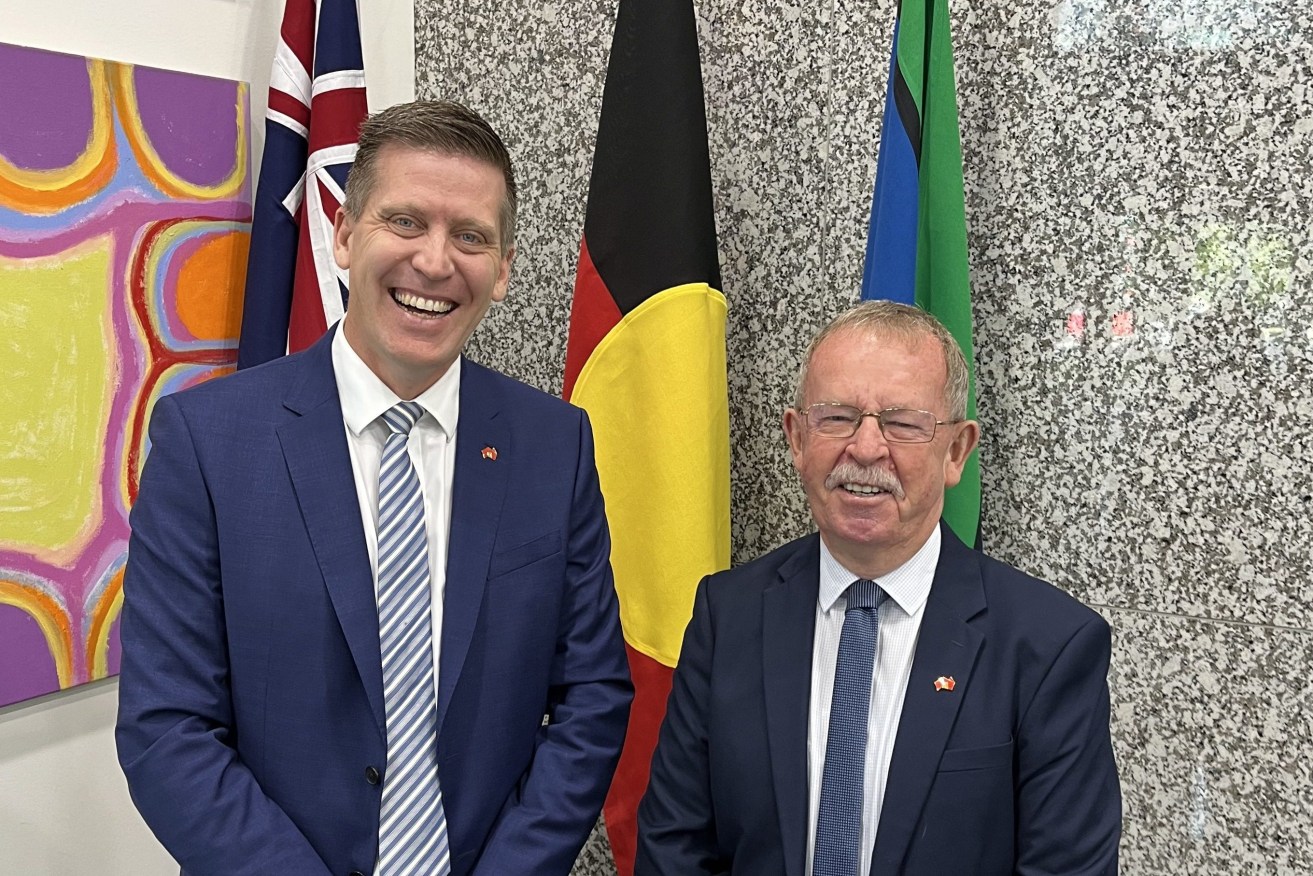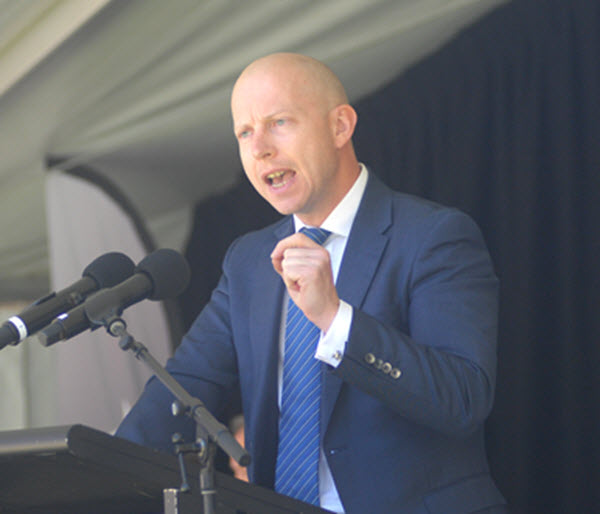Council spending ‘advice’ scheme revised after flak
The cost of a controversial scheme requiring councils to pay an independent regulator for financial planning advice has been revised after weeks of criticism – but the Local Government Association says question marks remain over its value to ratepayers.


Local Government Association of SA CEO Clinton Jury (left) and Local Government Minister Geoff Brock have been at odds over a mandatory "advice" scheme being rolled out to SA councils. Photo: supplied
The Essential Services Commission of SA (ESCOSA) last week issued its first round of financial planning “advice” to 15 South Australian councils as part of a mandatory four-year scheme introduced during the Marshall Government’s 2021 local government reforms as a compromise to rate-capping.
The aim of the scheme, according to ESCOSA, is to “give ratepayers confidence that the rates they pay are set at the level necessary for their council to provide the services they value”.
But the scheme, estimated by ESCOSA to cost $2.72m over four years, has attracted significant criticism from Burnside, West Torrens and Onkaparinga councils, primarily because each council is required to reimburse ESCOSA for costs “reasonably incurred” in compiling the advice.
The City of Onkaparinga last month claimed ESCOSA had quoted it $154,000 to receive advice under the scheme because the Commission would be charging councils based on the size of their membership fees to the Local Government Association of South Australia (LGA).
One councillor queried whether the council would have to sell an asset to pay for the advice.
ESCOSA CEO Adam Wilson denied the $154,000 quote but confirmed the Commission had indicated it would be allocating costs based on the LGA fee model, meaning larger councils would bear more of the costs.
However, following the complaint made by the City of Onkaparinga, ESCOSA informed councils last week it would change the final cost allocation of the scheme to an equal split between the state’s 68 councils.
Under the revised model, ESCOSA estimates each council will pay $40,000 over four years, or $10,000 annually.
ESCOSA said the decision came after it “received further representations from councils in relation to the costs of the scheme”.
ESCOSA also said it was making the change despite initially being urged by some councils not to adopt an equal split model.
“While submissions to the draft Framework and Approach urged a methodology other than an equal split (including the proposition adopted by the Commission… to utilise the Local Government Association’s membership fee allocation), having regard to the representations made since, the Commission has concluded that an equal allocation across councils is appropriate,” ESCOSA told councils on February 28.
“This is on the basis that, for at least the first cycle, any difference between councils in terms of the effort required to prepare the advice will not be known by either the Commission or councils.”
Following the change, City of Onkaparinga acting CEO Julia Grant said the council is “pleased with the commission’s final determination of the scheme costs and allocation methodology and believe it to be the most appropriate”.
“City of Onkaparinga will be in the second tranche of councils to receive advice from ESCOSA as part of the Local Government Advice Scheme and we are hopeful that it will be pragmatic and fit for purpose for our community,” she said in a statement.
But LGA of SA CEO Clinton Jury told InDaily the scheme was still flawed “regardless of the cost model that ESCOSA adopts”.
“The reality is this scheme has expanded far beyond what it was initially intended to be, both in terms of scope and cost,” Jury said in a statement.
The LGA has started reviewing advice and getting feedback from councils and while it’s early days, it’s clear there are question marks over the value this review has delivered to ratepayers.
“ESCOSA’s recommendations indicate most councils are already aware of the issues being highlighted – with existing auditing processes and financial management teams in place.”

Clinton Jury
InDaily asked the LGA whether it would be recommending changes to the scheme before it rolls out to a second round of councils later this year.
In response, Jury said: “We’ll continue engaging with the State Government on the advice, and value for money this scheme delivers before the next round of councils are assessed later this year.”
Local Government Minister Geoff Brock has remained steadfast that he would not make changes to the scheme before the first round of advice is distributed, arguing it would be “premature to consider changes to the scheme until the advice is rolled out in its entirety”.
In January, he rebuked City of Burnside CEO Chris Cowley who ridiculed the scheme as “a waste of ratepayers’ money” that would provide “blatantly obvious” advice.
Brock responded that Cowley’s “strident” commentary “does not constitute thoughtful and evidence-based policy development”.

City of Burnside CEO Chris Cowley, formerly CEO of the City of Whyalla. Photo: supplied
The City of Burnside received nine-pages of advice from ESCOSA about the council’s long-term financial plans. Both ESCOSA and the council are required to publish the advice.
ESCOSA made six recommendations to the City of Burnside, advising it to:
- Consider better clarity in its forward estimates in its long-term financial plan concerning the inflation assumptions feeding into its projected revenue (including rates) and expenses, distinct from ‘real’ impacts.
- Review its inflation assumptions in its forward projections from 2023-24, given the potential for higher short-term inflation outcomes, followed by a return to long-term averages.
- Continue the recent focus on constraining cost growth in its budgeting, where possible.
- Continue the good practice of reporting actual and projected cost savings in its annual budget, to provide evidence of constraining cost growth and achieving efficiency across its operations and service delivery.
- Continue the good practice of reviewing the capital expenditure program annually in its asset management plans and consider options to better align the assumptions underpinning the expenditure allocations with its long-term financial plan, including the estimate for asset lives and valuations feeding into the forecast rates of asset consumption and depreciation expenses.
- Review and consider limiting future increases in its average residential rates to help reduce any emerging affordability risk in the community.
A full copy of the advice can be found here:

Loading…
ESCOSA CEO Adam Wilson told InDaily the advice scheme is intended to “provide independent and transparent advice to the public, elected members and council administrations on forward-looking and long-term opportunities and risks, having regard to councils’ strategic management plans”.
“That advice is intended to assist public debates in relation to important community decisions, with councils able to respond publicly to the advice in their draft and final business plans,” he said.
InDaily asked Cowley what he made of the scheme after the first round of advice. In a statement, he said: “While I can appreciate the intent of this exercise and understand that State Government has a role to play to ensure that all Councils are financially sustainable, I continue to hold the view that the ratepayers should not be funding it.”




